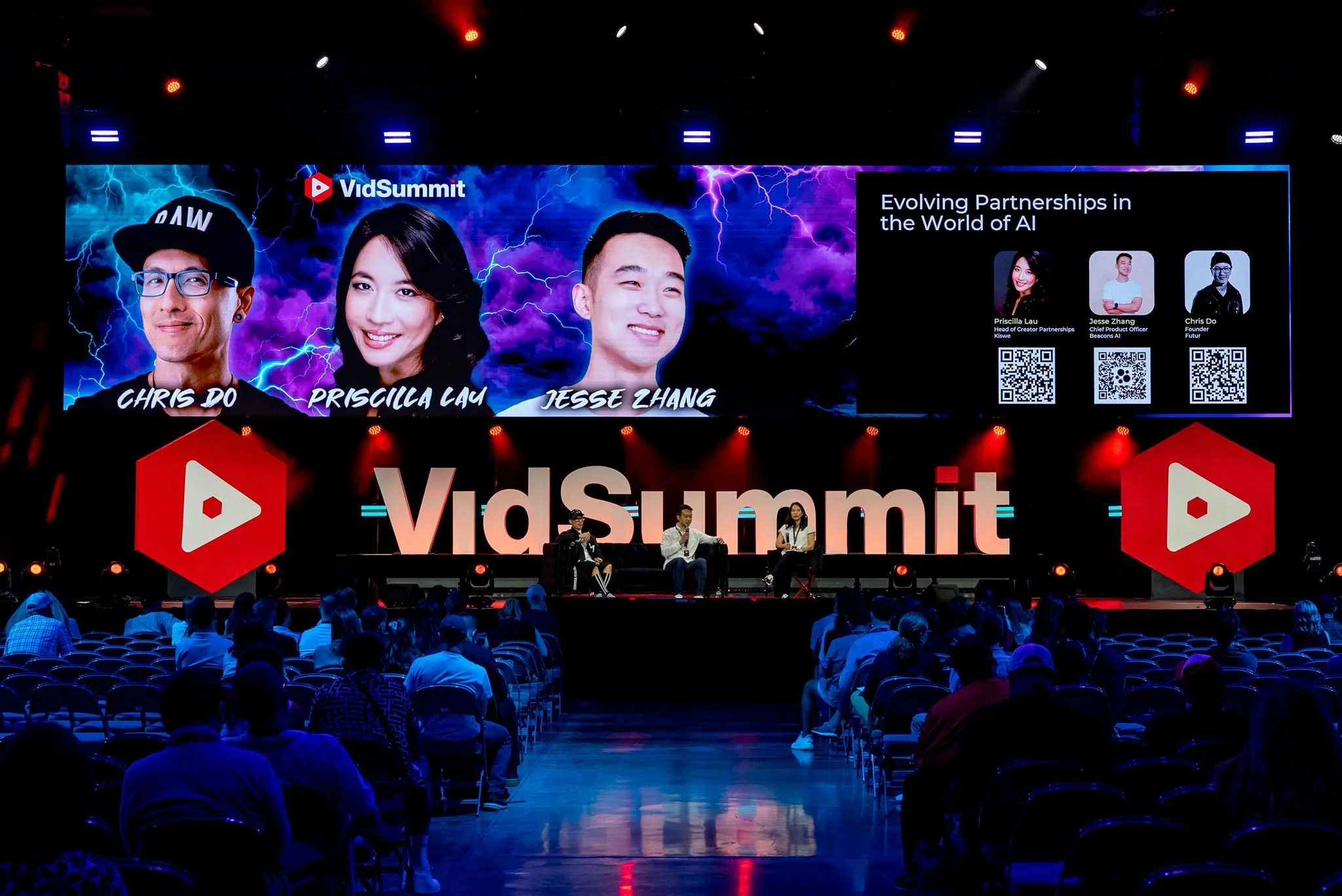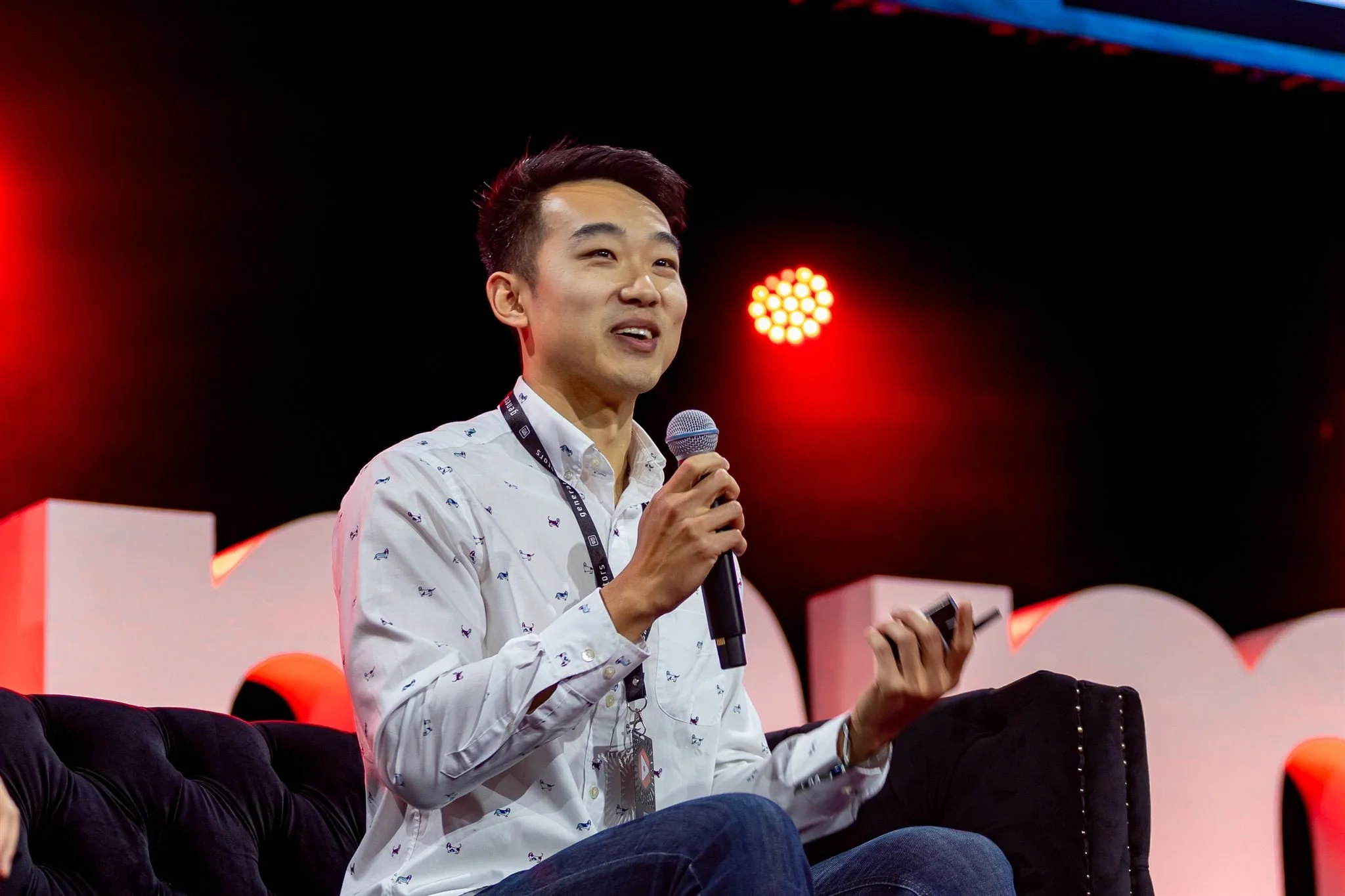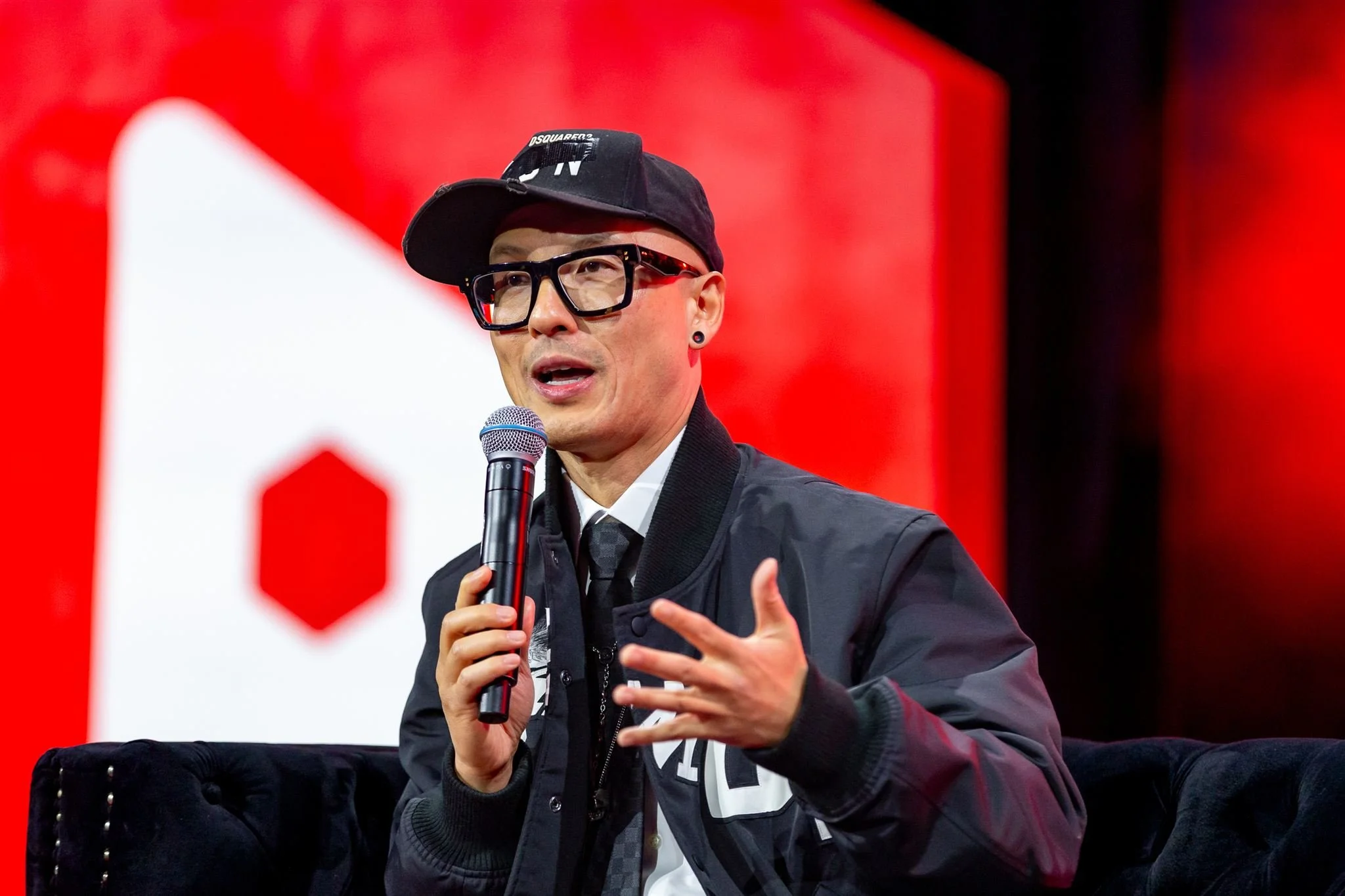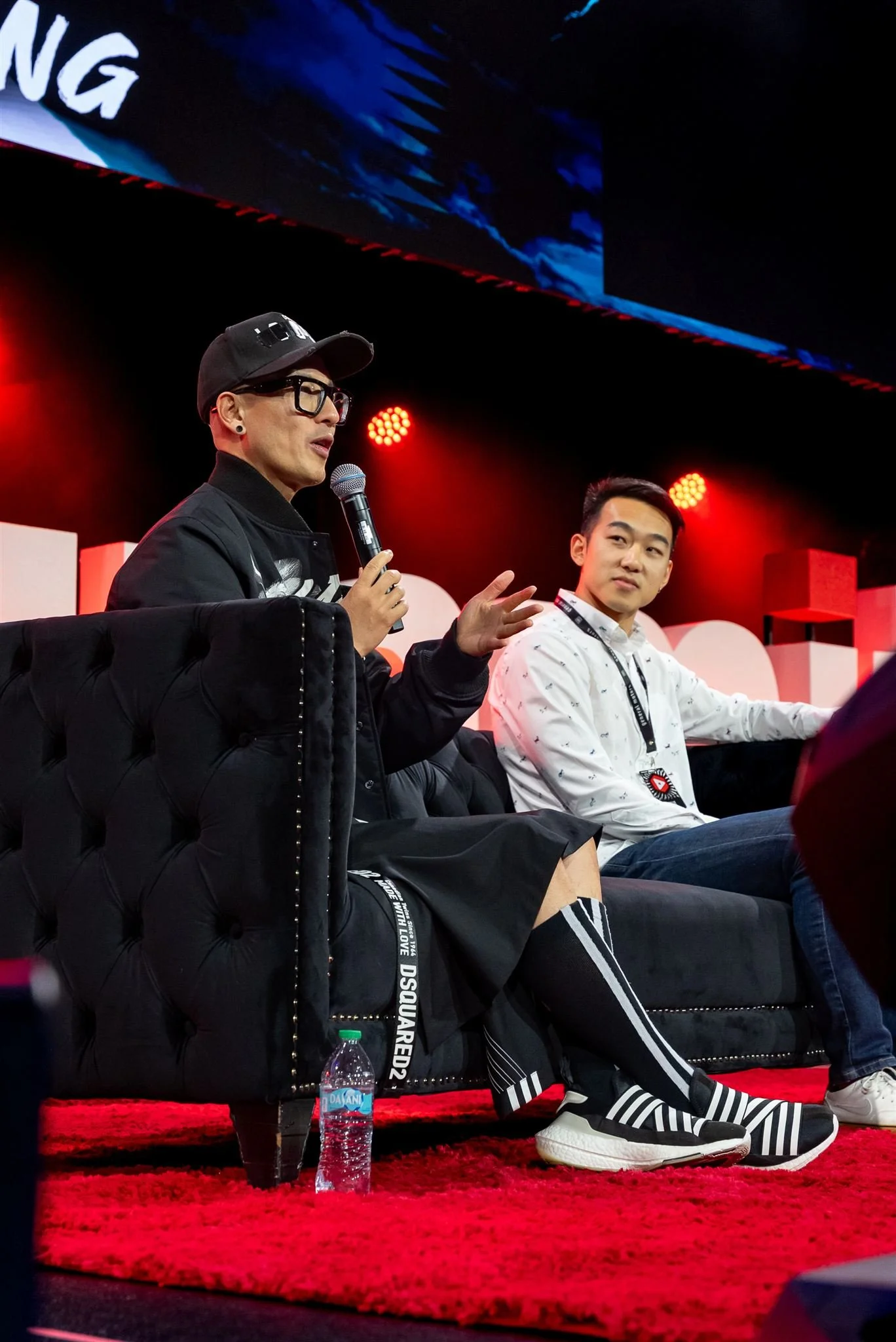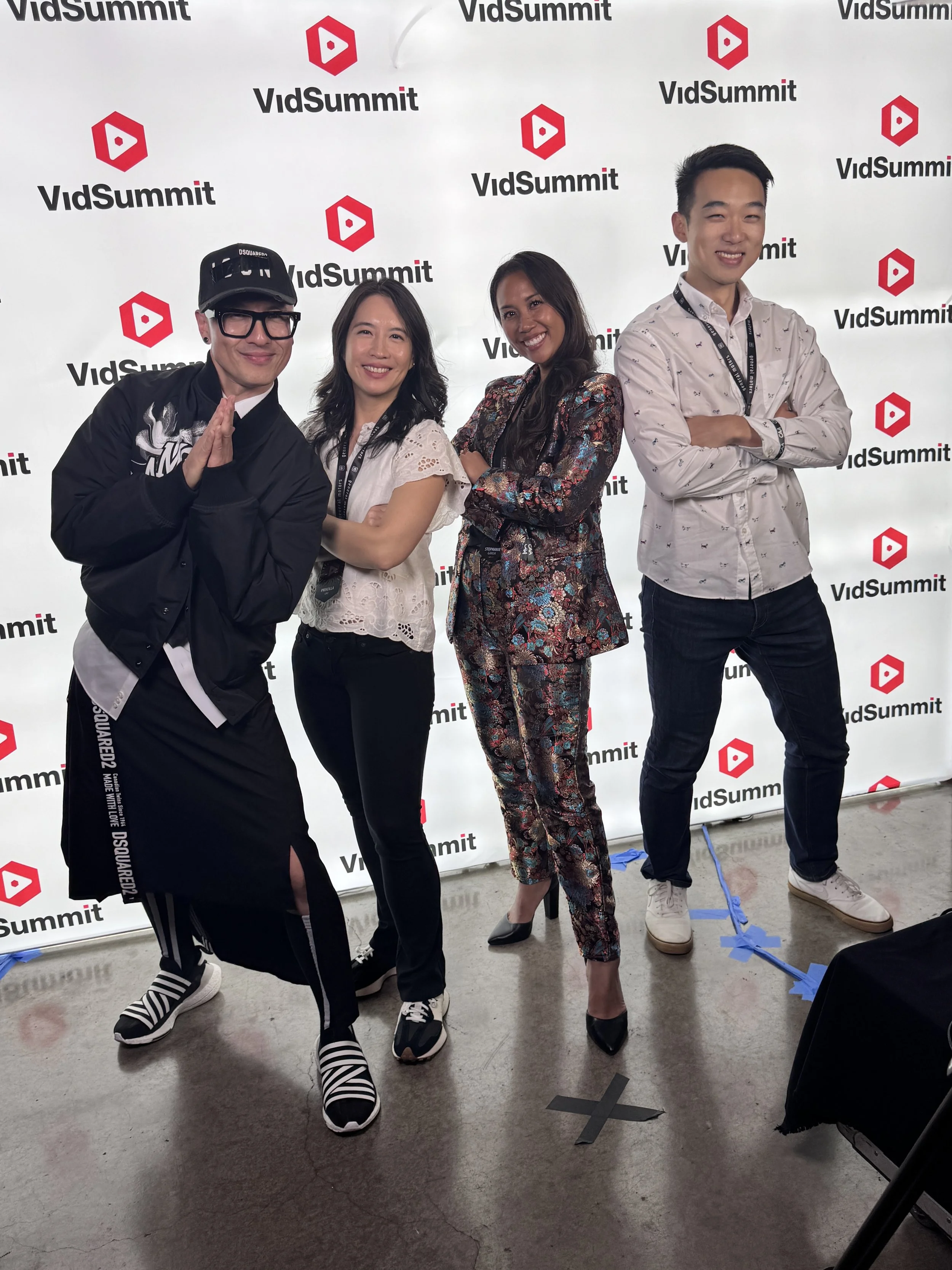What happens when a self-proclaimed "loud introvert" tech CEO, a Stanford AI PhD turned founder, and a creator partnerships expert come together to tackle the biggest question facing content creators today: How do we harness AI without losing our humanity?
At VidSummit 2025, this powerhouse panel didn't just theorize about AI's impact on creator partnerships – they revealed practical strategies that are already transforming how creators build sustainable businesses. With AI tools promising to slash costs across the media industry, creators packed the room to learn how to stay ahead of this technological tsunami while preserving what makes their content uniquely human.
Redefining Creator Partnerships in the AI Era
Priscilla Lau, Head of Creator Partnerships at Kiswe, set the stage with a compelling reality check. Recent Morgan Stanley research predicts AI will dramatically reduce costs across media sectors – a transformation that's already reshaping how creators work. But amid the rush to adopt AI tools, a crucial question emerged: How do we maintain authenticity and creative control while leveraging AI's capabilities?
The answer, it turns out, isn't about choosing between human creativity and artificial intelligence. It's about fundamentally rethinking how we work with AI – moving from viewing it as just another tool to embracing it as a creative partner.
The AI Teammate Revolution
Jesse Zhang, co-founder of Beacons and a former Stanford AI researcher, introduced a paradigm shift that challenged conventional thinking. "Just a year and a half ago, creators weren't really using AI at all," he explained. "Now, with over 800 million weekly ChatGPT users, we're seeing a fundamental change in how creators approach their work."
This evolution has led to more sophisticated applications, particularly in understanding creator-specific challenges. Zhang showcased how Beacons' AI assistant, Beam, exemplifies this advancement. "When you walk into Beacons to connect your accounts, he can help you with things like understanding what content is working and why, and he can help you navigate brand deals," Zhang explained. This isn't just automation – it's a strategic partnership.
Balancing Technology and Human Creativity
The room tensed visibly when Chris Do, founder of The Futur, addressed the elephant in the room: the fear of AI homogenizing creative content. "I think almost everybody in this room is either affected or using AI to augment the way they work," he acknowledged. "The challenge is when we use AI to do the thinking for us."
The Art of Creative Judgment
Do's perspective on developing taste and style struck a chord with the audience. "You can buy fashion, but you can't buy style," he explained, using this analogy to illustrate how creators should approach AI integration.
"In the past, art history or historians, the philosophy majors, the humanities were something you do and then you work at Starbucks," Do reflected. "But now I think it's kind of like this is your moment. If you have really great taste and you understand what's come before, I think it makes you really powerful because the machine already knows everything. It's a question of what do you know."
Reimagining Content Creation
The discussion shifted to practical applications as Do shared his own experience integrating AI into his creative process. His approach revealed a sophisticated understanding of balancing efficiency with authenticity.
"I can just say, 'Hey, I'm gonna be in Germany. Understand the audience. This is what the ticket price is, this is the demo. Help me write an outline,'" Do explained. But he quickly emphasized that this was just the beginning. "The heavy lifting is done… but I'm ready to do what I need to do to inject it with the creativity, personality, my personal stories."
Zhang added a technical perspective that resonated with the audience: "For a lot of senior or senior-level engineers, they don't want to spend all day fixing these little bugs. AI is actually able to fix them already." This same principle, he argued, applies to content creation—using AI to handle repetitive tasks while creators focus on higher-value activities.
Transforming Brand Partnerships
The conversation naturally progressed to how AI is revolutionizing creator-brand relationships. Zhang highlighted a pain point familiar to every creator in the room: "There's sourcing the brands, pitching the brands, figuring out rates, negotiating all that… it's just like a lot of things that have nothing to do with content creation."
This observation led to an exciting prediction: within the next year or two, AI will streamline these processes, allowing creators and managers to focus more on creative strategy than administrative tasks. The implications for creator partnerships are profound – potentially transforming how creators build and maintain brand relationships.
The 5 Million Dollar Lesson
The discussion took a powerful turn when Do shared a story that had everyone reaching for their notebooks. He spoke about Zach, a creator who transformed his business from $500,000 to $5 million in less than a year by following one crucial piece of advice.
"As creators and creative people, we fall in love with every stupid thing that we do," Do explained, drawing knowing laughs from the audience. "We can't open the door to opportunity 'cause we're busy entertaining all the dumb ideas."
The solution?
Focus on the 20% that's making all the money and let go of the rest.
Building for the Long Term
This led to a deeper discussion about sustainable growth in the AI era. Do introduced his philosophy of playing the "infinite game," which resonated deeply with the audience.
"If you show up every single day fully in your realized, authentic self and you try your very best to give value to other people and you don't ask for anything… you'll develop what I think is the most valuable thing in the world – tremendous goodwill."
The Human Element Prevails
As the session drew to a close, Lau posed a question that brought the discussion full circle: What human traits matter most in this AI-driven world?
The responses revealed the heart of successful creator partnerships. Priscilla emphasized "generosity and honesty," while Jesse highlighted "kindness and the mentality of giving." But it was Chris's celebration of "your dirty, imperfect self" that captured the essence of the entire discussion.
Looking Forward
Do's final challenge to the audience served as a perfect culmination: "Go talk to somebody today. They're as awkward as you are… that's the relationship that you're gonna build from this point forward that might change your life."
As creators filed out of the session, many were already forming small groups, taking Do's advice to heart. The message was clear: While AI will continue to transform how creators work, success in this new era depends on balancing technological advancement with authentic human connection.
The future belongs to creators who can harness AI's efficiency while maintaining their unique voice and building genuine connections with their audience. As Zhang noted, "It's not just about writing the doc anymore, it's about having a conversation."
How are you balancing AI integration with authentic creation in your content journey? Share your experiences and insights in the comments below.
